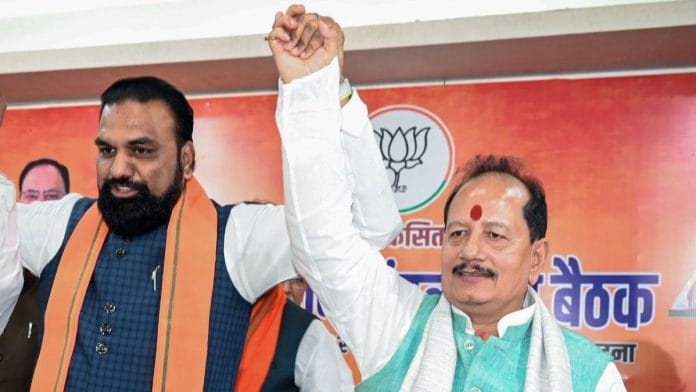New Delhi: The election of Samrat Chaudhary as the Bharatiya Janata Party Legislature Party chief in Bihar on Wednesday has created quite a buzz in political circles as this virtually projects him as the face of the party in the state.
On Thursday, he joined the Nitish Kumar Cabinet as a deputy chief minister, the other deputy being Vijay Kumar Sinha, also from the BJP.
There are also questions over the party’s decisions on Chaudhary since he was also a minister in the Rabri Devi government, a fact that flew in the face of the BJP’s ‘jungle raj’ salvos at the Rashtriya Janata Dal.
Multiple BJP leaders in Delhi and Patna who ThePrint spoke to justified the retention of Chaudhary and Sinha as deputy CMs, maintaining that the party has focused on ‘continuity’ and experience. Both had served as deputy chief ministers in the previous Bihar cabinet.
Fighting a battle of prestige, Choudhary had won the Tarapur seat with a big margin of over 45,000 votes.
A member of the Legislative Council (MLC), Choudhary in the past had contested from his home district Munger. Facing a triangular contest in Tarapur, he beat the Rashtriya Janata Dal’s Arun Shah and Jan Suraaj Party’s Dr Santosh Singh.
A senior party leader, while explaining the significance of retaining Chaudhary as Nitish’s deputy, said the Kurmi and Koeri are the two largest OBC castes in Bihar; while Kumar belongs to the Kurmi caste, Samrat Chaudhary belongs to the Koeri community.
“Samrat Chaudhary is the OBC face of the party and the results show that Kurmi-Koeri political alliance (collectively referred to as the ‘Luv-Kush’ vote) has taken over. The people have voted for continuity so it made no sense to disturb that equation and make any changes,” said a senior BJP leader.
Reflecting on the growth trajectory of Chaudhary, experts point out that the Kushwahas did not have a leader with a statewide presence and Chaudhary fits the bill perfectly and the support the party received shows that he is being accepted as a ‘face’ of the party. .
Explaining the importance of Chaudhary to the BJP, professor Rakesh Ranjan of the Patna University said, till 2000, Nitish and former deputy CM and senior party leader Sushil Modi had shared a good rapport.
“Both Modi and Kumar had developed a good rapport. For the past one year I have been sensing a similar rapport and comfort between Kumar and Chaudhary. His tuning with Nitish-ji is quite good and is similar to that of Sushil Modi. I remember when he went to Chaudhary’s constituency he urged people to vote for him in large numbers while pointing out that he will be given a big responsibility,” he said.
Both Kumar and Chaudhary come from the Kurmi-Koeri community, considered the foundation of Kumar’s voter base ever since the Janata Dal-United (JDU) chief challenged Rashtriya Janata Dal (RJD) leader Lalu Prasad Yadav’s Muslim-Yadav (MY) caste arithmetic in the 1990s.
“Samrat Chaudhary also seems quite comfortable with him. The party experimented with deputies like Renu Devi and Tarkishor Prasad but it didn’t work out in 2020. After that, Nitish-ji went to the Mahagathbandhan with RJD. When he came back, Sinha and Chaudhary were made the deputies,” professor Rakesh Ranjan said.
“The bonding between the two is good and at the level of perception they are seen as the Luv-Kush (Nitish and Chaudhary) jodi (Kurmi-Koeri). At the same time, there is a cemented vote of Kumar and this combination ensures that that vote remains with the NDA,” he added.
Choudhary, who courted controversy over his educational qualifications as well as a murder case, has been an MLA twice from the Parbatta constituency, which is part of Khagaria district.
Also read: After Bihar, the vote share vs seat share debate is back again. Here’s why this matters
BJP’s message to critics
Professor Ranjan further said that all four ministers against whom Jan Suraaj Party (JSP) leader Prashant Kishor had levelled accusations have been retained in the new cabinet, which shows that the party wants to indicate that the charges were unfounded and should not be taken seriously.
“It is like sending a strong message that the charges were completely baseless including those against Chaudhary,” he added.
Choudhary, in the past has also served as the state president of Bihar, a move which was seen as an attempt by the party to increase its support among OBC voters. He had parted ways with the RJD in 2014 to join the JD(U). He joined the BJP in 2017 after starting his political journey with the Rashtriya Janata Dal (RJD) in 1999, and switching to the Janata Dal (United) in 2014. He had also served as a minister in the government headed by Rabri Devi, wife of RJD veteran Lalu Prasad Yadav.
Another BJP leader said, when combined, the Kurmis and Kushwahas make up 7.08 percent of the state’s population, compared to the Yadavs who account for 14.26 percent.
“The party has to focus on developing the state leadership and Chaudhary fits the bill completely. Also, the community that he belongs to—Kushwahas—form the largest bloc among OBCs in Bihar after the Yadavs,” said a senior BJP leader.
“He has positioned himself as BJP’s prominent OBC face and his being the deputy CM can be leveraged later in Uttar Pradesh too where elections are due in 2027, where OBC vote bank is quite crucial,” he added.
Explaining the rationale behind the move, a senior party leader said that Choudhary enjoys the support of the central leadership too. While campaigning for Choudhary, Union Home Minister Amit Shah had said “you should vote for Bihar Deputy CM Samrat Chaudhary and make him win the election. If Samrat Chaudhary wins, Modi will make him a very important person”.
(Edited by Viny Mishra)
Also read: Sworn in as Bihar CM for 10th time, Nitish to lead govt with old hands on deck, some new faces






